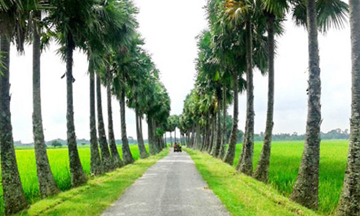RAJSHAHI, Oct 28, 2017 (BSS)-Infrastructure improvement has started contributing towards boosting income and reducing poverty in the rural areas.
Lutfor Haider Rashid, chairman of Kalma Union Parishad under Tanore Upazila, said development of upazila and union road, bridge and culvert, rural market, sanitary latrine, tube-well installation and tree plantation is very important for improving living and livelihood condition of the grassroots population.
In this regard, the Greater Rajshahi Division Integrated Rural Development Project has been playing a vital role, he added.
Local Government Engineering Department (LGED) has implemented 282 schemes under the project in 31 upazilas in Rajshahi, Natore, Naogaon and Chapinwabganj districts till June last.
The seven-year project is being implemented with an estimated cost of around Taka 208.76 crore with the main thrust of attaining sustainable economic growth and rural development through improving need-based infrastructure.
More than 69.51-kilometer Upazila roads and 228.03-kilometer Union roads alongside 1109.85-meter bridges and culverts were constructed for overall improvement of transport network of the rural area.
Ali Ahmed, Additional Chief Engineer of LGED, said the improved transportation network has started reducing the transportation cost and creating marketing facility of the produce. A total of 31 rural markets were improved to create short and long -term employment opportunity, socioeconomic development and poverty alleviation.
Participation of beneficiaries including women and local government institutions in planning, implementation and maintenance activities of the project were intensified.
Community people are being imparted training on campaigning and awareness building on health and nutrition. Through road maintenance, interests of the beneficiary market laborers group and women market traders along with poor women traders are being protected.
The project has also strengthened the institutional capacities and skills of project beneficiaries, local government institutions in planning and implementing agency.
Roadside tree plantation activities on the 158.50-kilometer improved roads are progressing successfully that will ultimately help reduce carbon emission at a substantial level and that is very important to face the adverse impact of climate change in the vast Barind tract.
Tubewell and sanitary latrines were provided to more than 7,120 poor and marginalized households for livelihood and pro-poor institutional development.
Thereby, occurrence of water-borne diseases is expected to be decreased. Safe-drinking water supply infrastructure will face the existing water-stress challenge.
The project is working for capacity building and institutional development through providing training to the Union Parishad representatives, LGED officials and community groups.
On an average, 80 per cent works on the schemes have so far been completed.
Engineer Ali Ahmed said implementation of these schemes would in fact further strengthen the overall activities of local government bodies and rural markets at the grassroots level.
The ongoing project is expected to be completed in near future. On competition, the project will contribute enormously to raising standard of living in the remote villages, he said.



